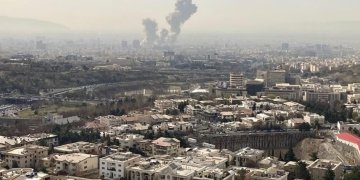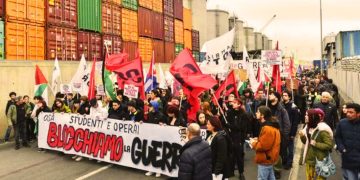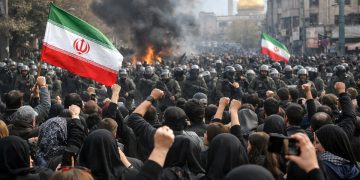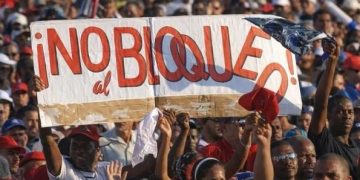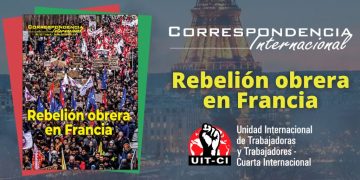Since 2008, Europe is at the centre of the capitalist crisis and the attempt to have the workers, youth and popular sectors pay for it. Since 2010, the European working class, although with inequalities and difficulties for its bureaucratic leadership, came en masse to fight.
The «adjustment»: assault on labour and social achievements
The colossal waste of the «bank bailout» in 2008 meant that the costs were passed on to the States. The vast majority of the 27 states that make up the European Union (EU) were indebted and unable to deal with the debt payments. With whom is the debt? Fundamentally with German and French banks, in that order. And who should pay, according to capitalists and their army of «economic experts»? The workers, immigrants, the poor. Why so? The explanation given: there were «waste years» and now «you have to sacrifice.»
The way to «fix», according to the big capitalists and bankers, is the «economic adjustment», i.e. to reduce the fiscal deficit to pay the debt. The European Central Bank (ECB), the IMF and the «European Commission» (political body of the European Union, reflecting the interests of the most powerful states, mainly of Germany and France), known, and hated, by millions of Europeans as the «Troika» are the institutions responsible for designing the extent of these adjustments for each country and for indebted governments to get «bailouts». That is, money borrowed from the ECB and the IMF to pay the German and French banks. And for that they must meet what the Troika commands: raise the retirement age, cut budgets for health and education, public servants layoffs, lower wages and increase in VAT. This policy was implemented even in some of the dominant powers of the European Union such as France and Great Britain. Another way to «rescue» the indebted is that the ECB lends to large banks at 1% interest and in turn they lend to these states at an interest of around 6% or higher. And the priority, under the so-called Fiscal Compact, is to pay this debt that grows unabated.
The attack on the health, education and other social services means the beginning of the dismantling of the «welfare state», achievement of the working class after World War II and, in turn, the price paid by imperialism to prevent, with the help of Stalinism, socialist revolutions in Europe.
And it is not just the states that cut, but large private capitalist corporations are also authorized to dismiss workers and lower wages, or even to close their industrial plants with very few requirements, invoking a crisis situation.
The criminalization of immigrants is another weapon in the hands of the capitalists against the working class. The immigration laws were the best labour reforms that States could impose without hitting sectors of the labour aristocracy represented in unions. «Paperless» labour was the cannon fodder of the production sectors that could not relocate — construction, agriculture, tourism, gastronomy. They created the reserve army alongside the legal immigrants who cannot miss work if they do not want to lose their «legality». And so they created the conditions for increasing exploitation, remove rights and divide the working class and they even planted the poison of racism and xenophobia among workers. It also began to persecute citizens of the countries of the European Union, especially Gypsies, Poles or Balkans immigrants.
The German-French domination of the European Union and its imperialist character
Within this new hierarchy in which Germany finished imposing their law, France and Germany remain the two decisive powers in the EU. That led to talk of Merkozy (Merkel and Sarkozy, the latter now replaced by the social democrat Hollande). To date, European countries account for more than half of German foreign trade turnover, as they are the source of most imports, with France as the top trading partner in both directions. But also, and mainly, Germany is the first creditor with the peripheral countries (€ 568.6 billion), followed by France (€ 440 billion), Italy (€ 96.4 billion) and, in turn, Spain is a creditor of € 127.6 billion (€ 99.8 billion are from Portugal). That is, the brutal adjustment in Europe is largely to pay German and French banks, which after reaping huge profits in recent years and indebting the States to bail out their own banks, now seek to collect at the expense of destroying the salary and social achievements.
The EU enlargement to the east was a requirement of the German multinationals, starting from the privileged position of the reunified Germany with close relations with Eastern Europe, they sought to take advantage of offers at «bargain» prices of mass privatization and chose the best sectors to relocate their industries, and could use skilled and cheap labour and proceed to a reduction in production costs of their companies.
The European Union has a distinctly imperialist character dominated by Germany and France. This character is expressed in its interior with the subordination of the southern countries and the severe limitation of national sovereignty by the EU institutions, which have no democratic character, even in the narrow bourgeois context. And it is expressed through multinationals in Latin America, Africa and Asia. The French imperialist intervention in Mali, in January 2013, showed starkly how imperialist military springs remain to defend their multinationals such as the predominance of French Fruit Company, the industrial holding Bolloré — present in 41 African countries and including from container terminals to plantations —, the Bouygues group — public works, water, electricity —, the Total in Nigeria or the world leader in nuclear energy, Areva, with its uranium mining in Niger. In defence of these interests they have resorted to diplomacy, supporting dictators, sending arms or mercenaries … else the armies of the various states.
The anti-democratic nature of the EU and the national States
The Stability and Growth Pact (SGP), the Structural Reform Pact for and Pact for the Euro have again put on the table the discussion on the transfer of sovereignty. These agreements bind states to the mandates of the major multinationals, moving them away as far as possible from the vagaries of the class struggle of their country, limiting them to even put social palliatives, but they are not qualitative changes in the role of the bourgeois state. These changes not only allow them to keep the essence of the nation state (the battalion of armed men in charge of maintaining class domination, as Engels said), but reinforce it in its most repressive and undemocratic traits.
The EU has never had a democratic character. The European Constitution was never approved, after the defeat in the French referendum of 2005. Then they changed the name, they called it the «Treaty of Lisbon» and not subjected to a referendum over except, forced, in Ireland.
The mere mention of the word referendum in Greece blew the alarm at the ECB, in governments and in all EU institutions. Papandreou was accused as uncaring, irresponsible and incendiary … All this for the simple fact that the government put on the table the possibility that the people decide on the most decisive event in their lives: the response to the crisis. What if that requirement was extended to the whole EU? Papandreou was forced to retract the referendum, which was never realized, and the Troika imposed the government of the «technocrat» Papademos with the demand of the support of the two major parties in parliament. Capitalism and all institutions fear the voice of the people. We defend the right of people to decide their future!
After Greece, Italy was also subject to the control and surveillance of the Troika. In full crisis, the government of Berlusconi, beset by demonstrations of rejection, was replaced by another «technocrat» Mario Monti. «Technocrat» governments attempt to rise above the political confrontation between the parties and the electoral calculations of these, to serve big business, including Italian or Greek respectively. National sovereignty is called into question, as it was in Latin America under the foreign debt.
In 2013 the crisis in Cyprus occurs and the Troika dictates a «corralito» (For the economic measures taken in Argentina at the end of 2001 which almost completely froze bank accounts, TN.) and a plundering of the bank deposits, closing banks and a privatization plan.
This situation of capitalist crisis and anti-democratic interventions to impose austerity plans exacerbates national problems of oppressed nations within nation states, as is the case of Northern Ireland, Basque Country, Catalonia, Scotland and Kurdistan in Turkey, which are not resolved despite the autonomy statutes in the case of the Spanish State or Scotland. We are for the full right of peoples to self-determination and as soon as we defeat the bourgeois central power, we will continue the systematic struggle for the unity of the proletariat in these countries, posing, strategically, a federation of socialist republics.
The working class and popular struggles
Since 2010 the working class came onto the scene in large scale. Thus we saw return of general strikes and worker demonstrations in Greece, Spain, France, Portugal and other countries.
In May 2010 the mass struggle in Greece massified, in response to the adjustment plans with cuts of 20 to 30% of revenues. A massive general strike and the largest demonstrations since the overthrow of the military dictatorship in 1974, with 300,000 workers on the streets of Athens. This strike opened a cycle of twelve general strikes in that year and hundreds of partial strikes and mobilizations. In 2010 there were also two general strikes in Italy, one in Portugal, a weaker one on September 29 in Spain and massive rallies in Great Britain and Ireland. In France, nine general strikes and blockades of fuel depots by oil workers.
The spring of 2011 saw up another resistance movement and repudiation of adjustment policies: In Spain will emerge the «Indignados» (Outraged) Movement (Spanish offshoot of the Occupy Wall Street movement in the U.S., TN). Tens of thousands of young students, unemployed, precarious workers, most without union organization, took to the streets and occupied Squares in the Spanish state for months. The movement spread, albeit less strongly, to several European countries.
In 2011 there were five other general strikes in Greece against Papandreou, the PASOK, and one against the new «technical» government of Papademos. In Italy, two strikes against Berlusconi. Massive demonstrations in Spain and a general strike in Portugal. In Great Britain, the most massive public sector strike, with about two and a half million workers in November. In Germany there were important sectorial strikes at companies like Lufthansa. In Belgium, a general strike in 2011 and another in early 2012.
In 2012 Greece continued at the forefront with their general strikes. New transport strikes and student demonstrations in Italy, public servants strike in Britain and large demonstrations and strikes in Portugal took place. In Romania, the year begins with the big protest of the «scissors» against budget cuts to public health. In the Spanish State there are two general strikes and the great strike of coal miners in Asturias and Leon, whose mobilization, roadblocks and confronting repression with rudimentary weapons, achieved great popular solidarity. And the year ends with the «European general strike» on November 14, actually a general strike in southern Europe, Spanish State, Portugal, Italy and Greece, the countries most affected by the adjustment.
In February 2013, large demonstrations in Bulgaria against rising electricity rates and demanding re-nationalization of electricity determined the fall of the Conservative government.
On March 2, 2013 there were, according to some sources, a million people mobilized in Portugal with the slogan «The Troika to the trash» and singing in the streets «Gandola Vila Morena» — the song of the 1974 revolution—, convened by the same platform which in September 2012 convened hundreds of thousands of people.
These huge fights do not manage, until now, to generate revolutionary leaderships with massive weight. The union bureaucracies generally related to CPs, to social democracy or the Labour Party in Britain, keep on relatively leading, but cannot stop the fight and in many cases are overwhelmed, as in the case of Portugal, where mobilization was called by a diffuse platform for organizations and CGTP (led by the CP) had to adhere bound by its rank and file (which in any case would have gone to the marches). The struggles have destabilized governments and made great general strikes and the southern European general strike. Nevertheless, the lack of revolutionary leadership, or even a consistently combative union leadership, is felt in that the fights do not have continuity and it takes months to achieve united action. And above all, that the vanguard, which is the Greek working class, is relatively isolated, without massive support from the European working class.
Political instability and anti-adjustment alternatives
Since late 2011, political instability is exacerbated by the combination of great strikes with the «punishment vote» in each election against parties that apply the adjustment. The defeats of Zapatero in the Spanish State and Berlusconi in Italy marked this dynamic. In 2012 the Sarkozy government in France is defeated, which together with Germany’s Angela Merkel were the binomial actually ruling the EU.
In Greece, there takes place the most advanced process with the collapse of its historic bipartisan system between social democracy of Pasok and centre-right of New Democracy. Pasok falls and sinks electorally. The EU imposed the «technical» government of Papademos, an auditor of the Troika. And in the 2012 election emerges an anti- adjustment reformist left current that obtained a high number of votes, with 27%.
In Italy, the February 2013 elections marked the depth of the crisis of the political system with an anti-troika vote: «technocrat» Prime Minister, Mario Monti, whom had been imposed by the Troika with the support of the Italian bourgeoisie and the establishment parties, was sent to the political dustbin with 10% of the vote, Berlusconi with 31%, 30% for the centre-left and the extraordinary 25% of comedian Boppe Grillo with its Five Star movement.
In Germany itself, the dominant and most stable country in the European Union, Angela Merkel’s Christian Democratic Party and its liberal allies lost almost all regional elections.
In this political crisis resurface also racist ultra right-wing sectors. The crisis and the lack of a revolutionary leadership pushes impoverished sectors of the petty bourgeoisie and workers to blame immigrants, and this is the breeding ground for the emergence of ultra right-wing sectors, as Le Pen in France or Golden Dawn in Greece, avowedly Nazi. Right-wing phenomena with significant weight also appeared in the Netherlands, Norway, Austria, Hungary, Switzerland and Denmark.
In Greece and Italy anti- adjustment political alternatives arise. Both the phenomenon of Syriza in Greece as Grillo with less clarity in Italy show the appearance of an alternative policy against adjustment, although with reformist proposals in the case of Syriza or almost without any proposal for Grillo. But in both cases the logic of voting for the alternative «opposition» (social democratic or conservative) within the two-party system is breaking.
Also in the Spanish State emerged an incipient turn to the left in regional elections and even candidates clearly of the left in Barcelona with electoral success, achieving three deputies, with Lucha Internacionalista (Internationalist Fight ) being part of the electoral front.
For a revolutionary program
Against the adjustment plans. Out with the Troika! Defence of public education and health, against the increase in tariffs, against wage cuts and layoffs. Demand expropriation of any company that fires its workers. Defence of immigrants, granting immediate documentation and full trade union, civil and political rights to community or extra-community immigrants.
Not to pay the debt: a matter of survival. We have seen the value and limits of nationwide strikes against the crisis and the cuts, but there is no real brake to the cuts without going through the non-payment of debt and the consequent exit from the euro, which would have a powerful exemplary effect in Europe, whichever the country to start it. The payment of the public debt now appears to large sections of the masses as the socialization of bank losses. That money is needed for social services, health, education, to create jobs, and so on.
Nationalization of the banks without compensation and under workers control to serve the interests of the popular classes. Expropriation without compensation of the banks, starting with those that have already received public aid, to create with it a public bank under control by the workers. Guarantee deposits of small savers, without acknowledgment of debts to other banks, and freezing of funds to prevent capital flight. With these funds necessary to implement employment plans. Creating a public park of social rental housing starting with the real estate portfolios of expropriated banks. Cessation of evictions for economic reasons and immediate incorporation of these houses the public park.
Down with the different governments: for workers’ and people’s governments. This must be a constant that must be placed in its proper place in each country and time, sometimes is pure propaganda, but in more and more countries, as it happened in Greece, Italy, Spanish State, Portugal or Bulgaria, this slogan can became at any time one for mass agitation.
Foster the mobilization and the national and European general strike. The call to fight, to the general strike in each country is entirely necessary to launch the working class and unite it opposite the government and the bosses. But today only the official unions are in conditions of convene it at fixed date. Therefore, any policy toward the general strike inevitably passes for directing the requirement of your convocation to all unions and very especially to them.
What happened to the Greek trade unions sets the stage. The GSEE and ADEDY (public sector) are under the political control of Pasok, Papandreou’s party, and that has not prevented that, in spite of their leaderships, they have been dragged to call general strikes, else, they would been abandoned en masse by the workers. It is not a question of hoping that it should happen, but to actively contribute. Creating a grassroots movement in the workplace, demanding with small written resolutions the convening of a united general strike of all unions, is the basis for generating this movement and open the debate on the working class. Only if this movement progresses it is possible: 1) that the majority unions eventually call to fight; 2) that a conscious break with those leaderships will deepen, or even 3) to be able to muster the forces with the ability to convene it by relying on the trade union rank and file, without hoping that the majority leaderships do.
The general strike is not a fetish. We are in favour of the general strike as an important step in mobilizing workers to defeat the government’s policy, but this does not mean that the general strike, understood as a 24-hour general strike, is the solution to all problems. To defeat the government’s plans we need more than a general strike; we need that workers be aware that the general strike makes them take the handle of the saucepan and that the general strike has to be followed by measures aimed at giving power to workers. Therefore, the importance of the general strike is in the process, in the grassroots organization prior to promote it, which maintains and ensures the general strike and the subsequent one, that should give it continuity in a fighting plan that must necessarily combine union and political slogans —such as Greece or Iceland style referendums — or specify actions that drive workers to the control of production or of service sectors, as the one that arose in the Greek general strike of February 2012, occupying a hospital under workers control, defending free health care, that calls for its generalization and questions the government. Its character objectively socialist could represent a leap in the process, if extended. Similarly, the great general strikes may combine with explosions of popular indignation, as it already happened in Greece, to incorporate the most oppressed layers of unemployed and marginalized youth and immigrants in direct clashes with repression.
For the internationalization of the struggle. Greece is at the forefront of the fight against the IMF-EU-ECB Troika that directs the offensive of capital. From inside the big unions, or from outside, we must join forces with a policy that excludes any sectarianism towards any union force. We must create a movement for a general strike to join the European struggles. The general strike of November 2012 showed that it is possible. We need to prepare a more extensive general strike, covering more countries.
Our confrontation with the EU as a Europe of capital is not from the standpoint of defence of national sovereignty, but from internationalism. Our project is a united Europe of the workers and the peoples, a Socialist United States of Europe. It is from this perspective of internationalism that we face the EU as a class project of the bourgeoisie to better impose their plans on the European workers.
Working for an international campaign of solidarity with the struggle of the Greek workers could be one of the first steps towards a superior international struggle.
To do this, and preparing for the future, it is urgent to build a European left-wing union current. The forces of capital, governments, international institutions and major employers hit together and draw their strength from our division. The Greeks are isolated and struggling alone. It is urgent the formation of a broad front of political and trade union organizations in each country and at European level around the break with the plans of the EU and IMF, creating union currents within the large bureaucracy controlled unions. 1) No to payment of the debt, that money is needed to maintain basic social services and start creating public employment. 2) Nationalization of the banks and the vital sectors of the economy, to place them under control of the workers. 3) Public investment plan with decent wages. 4) Distribution of work among the available bodies without loss of pay. 5) Guarantee for pensions and wages.
Build revolutionary parties, join the revolutionaries in Europe. The crisis situation is rapidly evolving and the greater tragedy is that we do not have organizations capable to orient the struggle of resistance and help open a path to revolution. This is the number one task of the moment. It is a task in each state and at European and international level.
We must exclude a sectarian policy to currents of the revolutionary left or of combative unions, of the youth. The response to be given to the specific tasks of resistance and revolution will separate and join. Active policy of calling to the coordination of the revolutionary left currents. This unity is not for theoretical discussions, but has to be focused on the tasks to stop the capitalist offensive in every country, solidarity with the Greek struggle and the revolutionary processes in North Africa and the Middle East.








